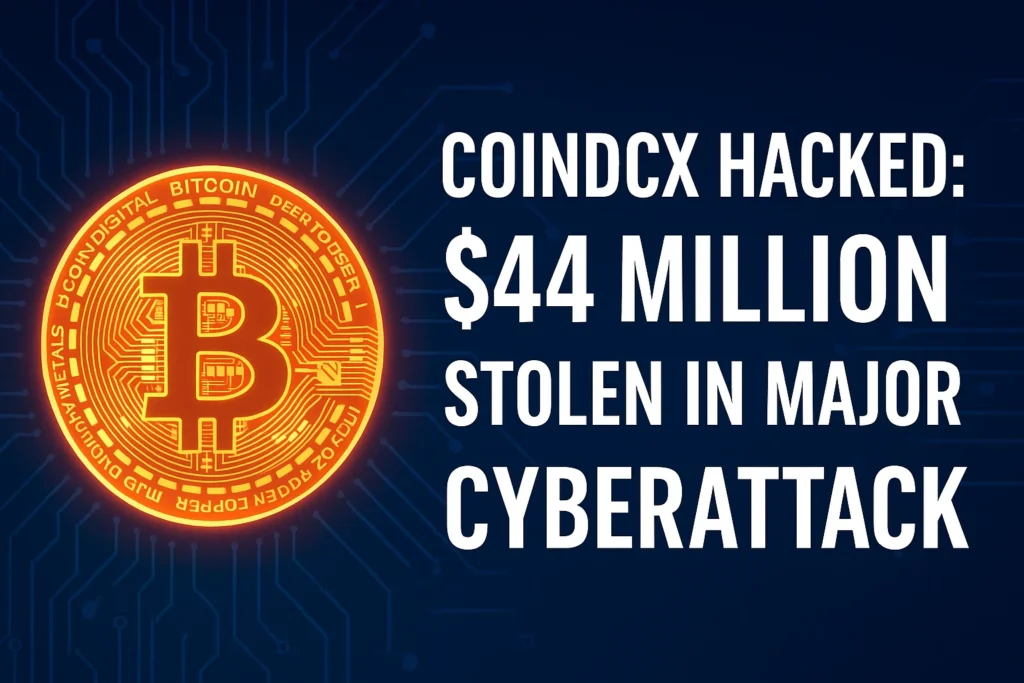CoinDCX Suffers Major Breach: What Happened?
India’s leading cryptocurrency exchange, CoinDCX, recently experienced a massive security breach resulting in a loss of over $44 million. The CoinDCX hack is being termed one of the largest cyberattacks in India’s crypto history. The breach reportedly occurred due to a compromise in one of the exchange’s hot wallets, sparking widespread alarm in the investor community.
$44 Million Heist: The Biggest Crypto Hack in India?
According to early reports, this CoinDCX hack may be India’s most significant crypto theft to date. The stolen funds, reportedly comprising multiple cryptocurrencies, were drained in a short time and moved through anonymizing services, making recovery difficult. The breach has raised questions about the robustness of CoinDCX’s security infrastructure.
How Hackers Gained Access to CoinDCX Systems
Cybersecurity experts suggest that the hackers exploited vulnerabilities in CoinDCX’s hot wallet infrastructure. While exact technical details haven’t been disclosed, many believe the attack could have involved phishing, social engineering, or outdated software systems. The exchange is currently working with forensic blockchain analysts to trace the flow of stolen assets.
Was User Data Compromised in the CoinDCX Hack?
As of now, CoinDCX has assured users that no customer personal information or private keys were leaked in the breach. However, given the scale of the attack, users remain concerned about potential downstream impacts. The company has committed to enhancing its data protection policies and releasing updates as investigations progress.
CoinDCX Responds: What the Exchange Is Saying
In a public statement, CoinDCX acknowledged the breach and confirmed that law enforcement and cybersecurity partners are involved. They also stated that customer funds stored in cold wallets remain safe. The exchange is assessing whether affected users will be reimbursed and is considering the launch of a new insurance-backed security framework.
Security Lapses or Insider Job? Experts Weigh In
Some security analysts have speculated that the breach may have involved internal negligence or even an insider threat. Others argue it highlights systemic vulnerabilities common in fast-growing crypto startups. While no definitive cause has been announced, industry voices are calling for standardized security audits across Indian exchanges.
Impact on Indian Crypto Market: Investor Reactions
The CoinDCX hack has sent ripples through the Indian crypto community. Bitcoin, Ethereum, and other coins saw a temporary dip in domestic trading platforms following the news. Investor sentiment remains cautious, with many shifting assets to decentralized or international exchanges. Experts suggest this may slow adoption and erode trust in local platforms.
Regulatory Fallout: Will the Government Step In?
The CoinDCX incident has reignited calls for stronger regulation of the crypto sector in India. Lawmakers are urging the Reserve Bank of India (RBI) and Ministry of Finance to draft urgent guidelines on cybersecurity practices for exchanges. This could lead to mandatory audits, KYC enhancements, and possibly a central regulatory body.
How to Protect Your Crypto After the CoinDCX Breach
The CoinDCX hack serves as a wake-up call for retail and institutional investors alike. Experts recommend using hardware wallets, enabling multi-factor authentication (MFA), and diversifying exchange usage. Investors should also stay updated with platform policies and security advisories to protect their digital assets.
Conclusion
The CoinDCX hack has exposed significant gaps in India’s crypto ecosystem, both at the technological and regulatory levels. While the full impact will unfold in the coming weeks, it is clear that investor vigilance and better security frameworks are now more crucial than ever.
More in Business Insider
